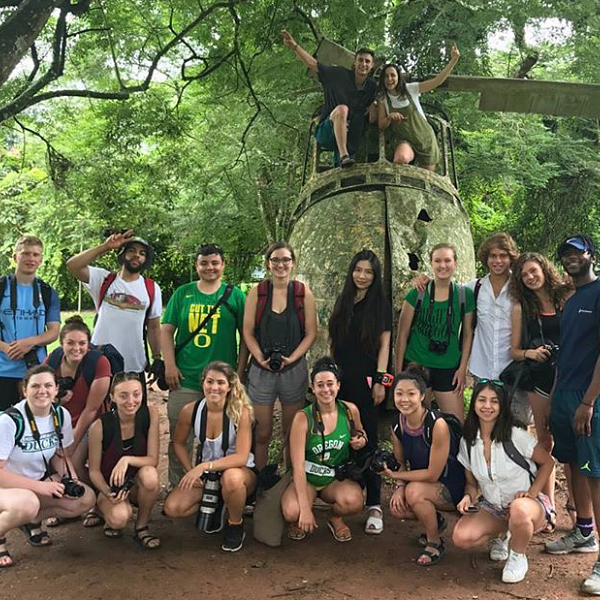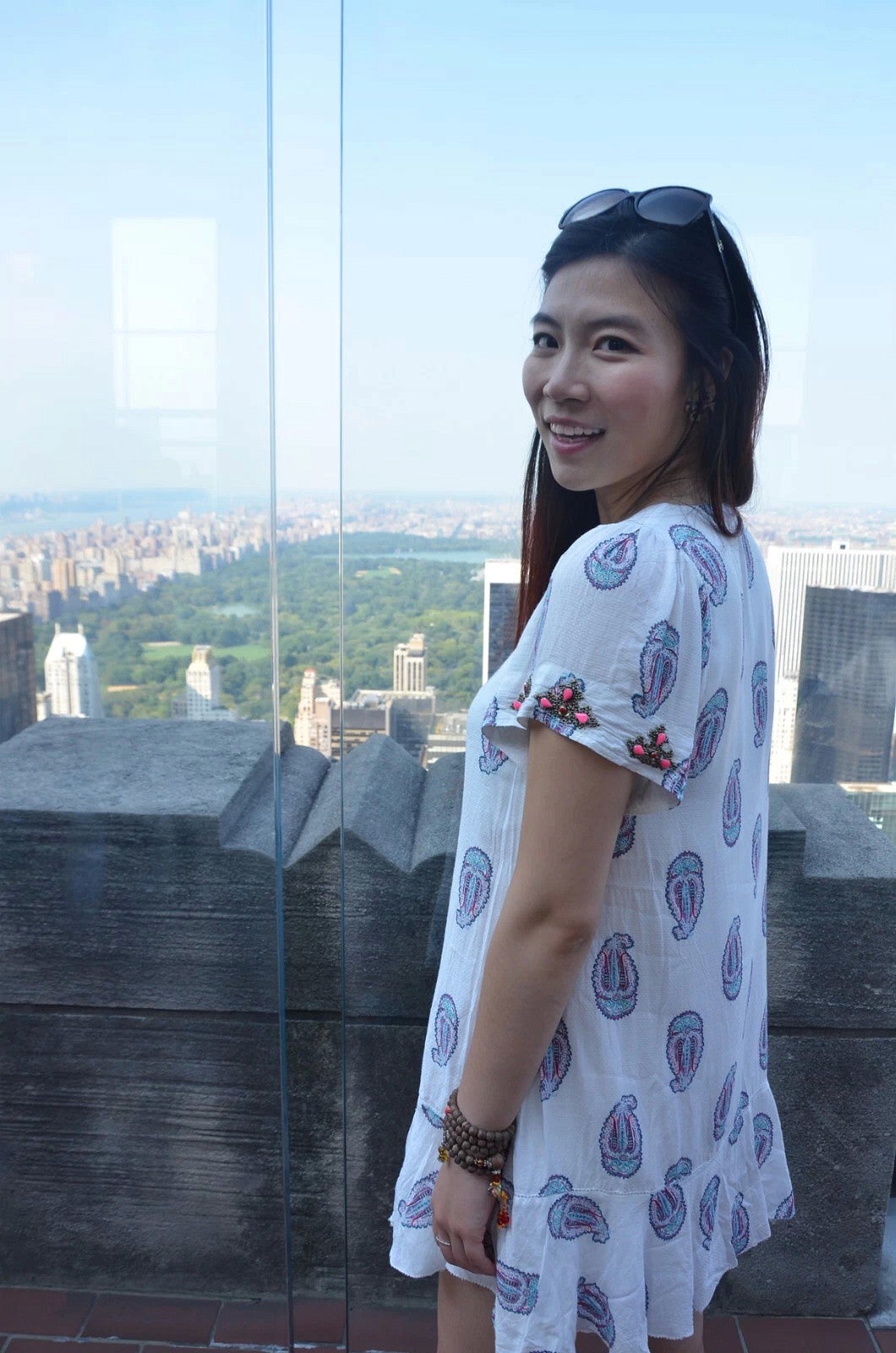
Story by Randy Newnham
Shuo Xu, MA ’17, does not shy away from controversy.
As a doctoral student in the UO School of Journalism and Communication’s Media Studies PhD program, a recent graduate of the school’s Journalism Master’s and Media Studies Master’s programs, and an intern with the school’s Media in Ghana program, her work shows that students can make a real impact on the world.
During her Media in Ghana internship in summer 2018, Xu worked with award-winning Ghanaian investigative journalist Anas Aremeya Anas on a reporting project that exposed massive corruption and caused a shake-up in professional football in Africa. No one knows what Anas looks like, and he uses his anonymity as a tool to expose human rights violations and corruption in his home country.
Now in her first year as a PhD student at the SOJC, Xu has turned her focus to research. True to her passion for social action in developing countries, she is studying censorship in China.
We recently sat down with Xu to discuss school, her research and her plans for the future.
Where she’s from: My hometown is Dalian, China.
Favorite spot on campus: Allen Hall, of course!
Favorite faculty: Professors Gabriela Martínez, Leslie Steeves, Chris Chávez and Scott Maier. I know this is a long list, but it can be even longer! I love the SOJC. These professors are so supportive. They care, and they are working to make their students succeed.
People might be surprised to know: The Media in Ghana program is definitely one of the best study-abroad programs. As an international student, I have many years of experience studying abroad. So I think I could be the one to evaluate such programs. Professor Leslie Steeves puts so much effort into this program. It is so well designed, and everyone who has participated wants to go back again. Participants can learn and experience a lot in those six weeks, including the culture, the people and the hands-on internships.

Advice for current students: Do what you love, and love what you do.
Why did you decide to pursue the fields of journalism and media studies?
When I was a child, I always envied the confidence and poise of reporters and pictured myself as one in the field, holding a microphone and speaking in front of a camera. Following that dream, I applied for and was accepted in the SOJC’s professional Journalism Master’s program.
During my graduate studies and journey to become a professional journalist, I learned not only the craft, but also the inside workings of the industry. I became very interested in the press as an evolving industry due to the influence of emerging technologies and new media. I also gained exposure to the scholarship of media studies and learned about the more theoretical aspects of the fields of media and communication, and within these, journalism as a site of analysis. So I applied and started studying in the Media Studies Master’s program too.
What was it like to work with the Tiger Eye Foundation? Do you feel your work made a difference?
On the Media in Ghana trip last summer, while performing tasks as an investigative journalist for Anas’s Tiger Eye Foundation, I learned much about the utility of journalism in developing countries.
At Tiger Eye, I participated in two ongoing undercover projects. I researched extensively on a particular issue, although I cannot reveal the specifics due to the nondisclosure agreement I signed. I familiarized myself with the social and cultural contexts underlying the issue and contributed to the preparation stage with my unique perspectives. To augment the efficiency of our investigations, I gathered and analyzed footage prepared by team members and provided a crucial roadmap for the investigation.
I impressed Anas with my work ethic and fluency with data as I gathered all the available data pertaining to the issue. Also, I went the extra mile by locating and working with a local guide. With the guide’s assistance, I identified locations and people potentially related to the project. By listening to people’s life stories, I gained awareness of the local culture and came to grasp the root cause of the issue.
I realized the real objective of the projects was to positively impact Ghanaians’ lives. I have kept participating remotely in this process and assisting the team in the postproduction phase. With the footage we shot, the team began completing the multimedia piece.
This internship further strengthened my interest in research, as well as my understanding of the value of research skills in journalism production, distribution and impact.
Recently, one of the projects I worked on aired on BBC. It is about the corruption in Ghana’s football (soccer in the U.S.) system. Later, the government of Ghana dissolved the Ghana Football Association. It was so impactful that the whole African continent is still talking about it, according to my coworkers at the Tiger Eye Foundation.
What are you researching now?
My area of interest is Chinese media censorship. This term I am researching the disparities in framing the Dalai Lama in the U.S. and Chinese media.
The Dalai Lama is reported in different ways not only because of his unique identity, but also because of his international impact. By doing this research on differential portraits of the Dalai Lama in the Chinese and U.S. media, I wish to enhance scholarly understanding of cross-cultural news media representations of controversial topics.
What do you plan to do after graduation?
My goals are to become a researcher of journalism and media studies with an emphasis on media, democracy and human rights; to teach at the undergraduate and graduate levels; and to inspire new generations of media professionals and scholars.
Why did you decide you want to teach?
The trip to Ghana expanded my understanding of teaching. One day, a group of American students and I visited a local elementary school. To welcome us, students dressed up in their school uniforms and put on a performance. As the children jumped up and down, waved their hands, and sang beautiful songs for us, a memory from 18 years prior resurfaced. My elementary school class was picked to greet American guests in a cultural exchange program. I learned my first English song, “Old McDonald Has a Farm,” and performed it with my classmates. I remembered being in awe of the look of those foreigners. They were tall, with pale skin and blue eyes. I had never encountered people with such features, and I was intrigued by both them and the camera equipment they used to record our performance. When I went home, I told my mother about my experience. She said the world is expansive and filled with amazing things, and I should work hard so I can explore it myself one day.
Upon seeing the performance by the Ghanaian children, I knew the seeds planted by those American guests had blossomed, because I was inspired to travel outside of my hometown and study abroad. Suddenly, I felt warmth in my heart. At that moment, I knew I was planting the same seeds in the hearts of these children. Maybe some will study hard, leave home and explore the world.
This experience taught me the meaning of education: to guide curious minds in the exploration of their interests. The SOJC’s PhD in media studies will enable me to play that role in the lives of my future students.
Randy Newnham, a senior majoring in public relations in the UO School of Journalism and Communication, would rather be pulling espresso shots and playing board games. But the world needs at least one more social media manager, and Randy has risen to the challenge. Together, with the plucky band of underdogs that is his family, Randy fights dirty for social justice. Randy can be found on Twitter, Instagram, LinkedIn and in various coffee shops around Eugene.
